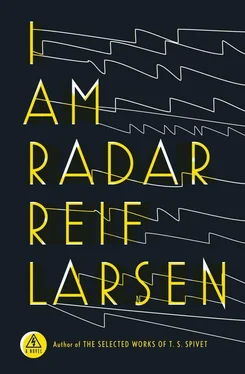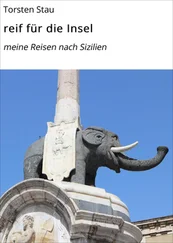Finally, after he had lunged and was sent sprawling across the floor for the umpteenth time, Kermin lay on the ground, soaked in sweat. The muscles in his arms were shaking uncontrollably.
“That bear, that bear. .” he whispered. “Mamojebac.” He was crying from the pure effort of his defeat.
Leif approached, clapping his hands. “Amazing. We’ve been here for just over an hour. You possess such great resolve. Such self-belief. It is a rare quality these days.”
“This bear is unbelievable,” said Kermin.
“Not so unbelievable. I built him myself.”
Kermin slowly rose to his feet, his head pounding.
Leif carefully circumnavigated the bear and then approached from the rear, where he casually reached around the giant stomach, as if to hug the beast, before tapping the pendant with his finger. An alarm sounded and the bear froze stiff.
“Every problem must have a solution,” he said. “Come here, Kermin. Let me show you.”
Still breathing hard, Kermin joined Leif behind the bear. He had removed a part of the bear’s fur and was holding the flap open for Kermin to see inside. In the dim light, Kermin squinted and saw the glint of metal — hundreds of intricate gears and cables standing still inside the creature.
“What?” said Kermin.
Among the gears he could see the white stencil of the eye.
“Yes. You see?” said Leif. “Every move was preprogrammed. He knew what you would do before you did it.”
“How?” Kermin felt as if he were falling down a deep well.
“He’s a puppet. He’s a god.”
• • •
OUTSIDE, THE SUN was finally setting. The dusk, stretched and weightless. Everything smoldering white, yellow, pink. Not so much a sunset as a suspension of disbelief.
“The sun will rise as soon as she sets. Like a breath,” said Leif. “To really understand the mind-set up here, you must first understand the light. . In the summer, there is no night. We’re illuminated for twenty-four hours a day. Our skin becomes confused — you feel alive, like you might never die, as if anything is possible. People don’t realize this, but there are many more deaths in the summer than the winter, because people believe they’re invincible. In the winter you are much more of a realist. The daylight grows shorter until there is no day at all. But it is not completely dark. There is a wonderful depth to the sky in the winter — the light is almost blue. I feel most at peace then. In the summer I do not sleep, but in the winter — this is when I do my thinking.”
They walked. Kermin was still shaken by the image of the bear’s metallic innards. There was no life in there, only the click and pop of the mechanism. The promise of movement. The sum of all those gears had equaled his defeat.
He patted his sore hands against his hips and looked up. The sky had turned soft and thick, the light suspended above their heads like a sheet. As if light were a language spoken between heaven and earth.
Kermin realized then that this was the most beautiful place he would ever see in his life. The thought saddened him, for it was an empty beauty, a reluctant beauty, a landscape of longing you did not want buried with you in your grave.
“I’ve been thinking a lot about the pole,” Leif said suddenly.
“What is the pole?” Kermin asked, not quite listening.
“The North Pole. It’s a place that often recurs in my dreams. Did you know that at the pole, the sun only sets once a year? A six-month day followed by a six-month night.”
“When do you have breakfast?”
“Ah! You are a funny man, Kermin. Most people probably don’t understand this about you. When indeed? Two months in? Three months? Or do you go directly to brunch? You can see my dilemma. On the one hand, the pole is a point of infinite possibility. The lines of longitude converge there, and so the North Pole contains all longitudes at once. In essence, you could choose any coordinate with a latitude of ninety degrees north and you would be correct about your position. How to function with so much choice? But then on the other hand, the only direction you can head is south. Can you imagine? You have no choice. You must head south, there is no other way. Wait—” Leif grabbed Kermin’s arm and pointed.
“Look.”
They stopped and watched the sky. The sun, perched on the lip of the horizon, seemed to tremble before sliding from view. The world blinked, waited, and then there was the sun again, rising unperturbed, as if it had all been some kind of performance.
Kermin turned and seized Leif’s shoulder. They stood looking at each other, caught inside their own magnetic field.
“Will you hurt him?” Kermin asked. His grip was firm, but there was tenderness in that connection, an insistence to the present.
“I will not,” said Leif.
“But you can do what you say?”
“I’m not in the business of lying, my friend. I say what I mean.”
“I care about him more than anything.”
“Of course.”
“But I must also take care of my wife.”
“Of course you must.”
Kermin released his shoulder. “After, how will he be?” he said quietly.
“This I cannot say,” said Leif, shaking his head. “But how does that saying go? ‘To know the son, look at the father.’ ”
They walked on and came to the entrance of another lodge. Another eye above its doorway, staring at them. Leif saw Kermin looking at the emblem.
“If the eye belongs to no one, what does it see?” he asked. And then he opened the door and flicked on the light, which sputtered to reveal a large room filled with shelves of cogs, gears, and pulleys. There were rolls upon rolls of wire and dangerous-looking three-pointed mechanisms and small wooden mannequins contorted into ghastly pirouettes. Kermin looked up at the ceiling. From the rafters hung hundreds of puppets. Hundreds and hundreds of them. All of them headless.
Kermin stared. He had never seen such a collection of wonders in his life.
“As you can see, we’re running out of room,” said Leif.
“Where are their heads?”
“An old superstition. If you leave the puppet’s head on overnight, it may come to life and take its revenge,” said Leif. “You must separate the body from the mind.”
“And all of this stuff is for making your puppets?”
“Yes. But unfortunately, for our next show we need something more.”
“More than this ?”
“You know how it is. You want what you cannot have. Our next show is about a brand-new idea in theoretical physics called the quark-gluon plasma, a condition that existed briefly after the Big Bang — at least in theory.”
“I don’t know about this.”
“The basic idea is that following the birth of our universe, there was a moment of extremely high temperatures. We are talking extremely high, as in never before or since — a singular thermopoetic event. At these temperatures, all matter breaks down into essential building blocks. And for a moment there, right after the creation of our world. . everything was broken and everything was the same . No larger unique molecules, no atoms, no nuclei — just a sea of indistinguishable quarks and gluons. Can you imagine it? The whole universe as a sea of sameness.”
“It sounds bad.”
“It sounds beautiful. And it sounds a bit like some of the most extreme forms of communism, yes? Complete and utter equality?”
“Communism never works this way.”
“Not yet, at least. And I’m not talking about your brand of bourgeois Eastern European Tito communism. This is like window dressing. You must look farther east for the plasma. Burma. The Khmer Rouge in Cambodia. North Korea. China. Well, maybe China no longer.”
Читать дальше












